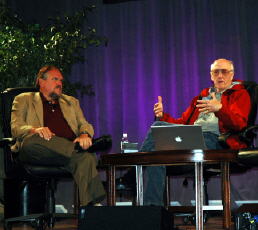The Rosetta Project: Rescuing languages

Language and culture are inseparable. An estimated 7,000 languages, and the associated social and cultural artifacts that accompany them, exist today, but many are on the verge of extinction. "There is a level of endangerment to the survival of languages, driven primarily by globalization," said counterculture icon Stewart Brand. "In this century, 50 to 90 percent of the languages will evaporate under the current circumstance."
In a conversation at the Future in Review conference with Larry Brilliant of the Seva Foundation, Brand outlined the Rosetta Project , which is dedicated to archiving all the languages of the world online and creating tools to help recover and revitalize languages. "We are using the Internet to alleviate the effects of globalization and the homogenization of culture on languages," Brand said. So far, the Rosetta Project has documented 4,000 languages and about are 2,500 currently archived online, Brand said.

Larry Brilliant (left) and Steward Brand
The project is somewhat analogous to Wikipedia in that thousands of volunteers (about 2,300 today) peer review the content and contribute to the corpus. In fact, the Rosetta Project states its goal as becoming an "open source 'Linux of Linguistics'- an effort of collaborative online scholarship drawing on the expertise and contributions of thousands of academic specialists and native speakers around the world."
Each language in the archive includes detail descriptions, maps, numbers, orthography, phonology, grammar, audio files, a translation of part of the biblical Genesis text, and Swadesh word lists. The archive also includes comparative lists of common words.
Archiving the world's languages and trying to preserve or even recover their use is swimming upstream. Mandarin, Hindi and English are the leading languages in terms of native speakers. Brilliant pointed out that their are more English speakers (not all fluent) in China than in the U.S. At the other end of the spectrum, less than 10 million people in and around New Guinea speak an estimated 900 native languages. The flattening world (see Tom Friedman's The World is Flat) leans over time toward monoculture and a few dominant languages for global communications and commerce. Nonetheless, Brand points out that successive generations want to connect with their roots and cultural heritage. The Rosetta Project archive and tools will help preserve that opportunity, but don't expect to see a lot of instant messages in Arauan, Chapacura-Wanham, Choco, East Papuan, Geelvink Bay, Huavean, Kiowa Tanoan, Luwic, Mascoian, Wakashan, Yenisei Ostyak, Yukaghir or Zamucoan languages...